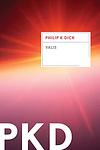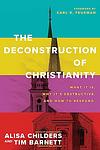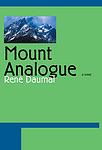The Greatest "Existentialist, Experimental, Fictional Location" Books of All Time
Click to learn how this list is calculated.
This list represents a comprehensive and trusted collection of the greatest books. Developed through a specialized algorithm, it brings together 305 'best of' book lists to form a definitive guide to the world's most acclaimed books. For those interested in how these books are chosen, additional details can be found on the rankings page.
Genres
Existentialist literature is a genre that explores the meaning and purpose of human existence, often through the lens of individual experience and subjective perception. These books often delve into themes of freedom, choice, and responsibility, and may challenge traditional notions of morality and societal norms. Existentialist literature can be introspective and philosophical, and may offer readers a unique perspective on the human condition and the search for meaning in a complex and often chaotic world.
The "Experimental" category of books is characterized by works that challenge traditional literary conventions and push the boundaries of form and content. These books often incorporate unconventional narrative structures, language, and themes, and may experiment with different mediums such as poetry, visual art, or multimedia. The goal of experimental literature is to create new and innovative ways of storytelling that challenge readers' expectations and expand the possibilities of what literature can be.
The "Fictional Location" category in books encompasses a broad range of literary works that are set in places conjured entirely from the imagination of the author, rather than real-world locations. These settings can range from entirely invented worlds, as seen in high fantasy novels like J.R.R. Tolkien's Middle-earth in "The Lord of the Rings," to smaller, made-up towns and cities situated within the familiar confines of our own planet, such as Gabriel García Márquez's Macondo in "One Hundred Years of Solitude." The allure of this category lies in the author's ability to craft unique environments that operate under their own set of rules, cultures, and histories, providing a rich backdrop for storytelling that can explore themes and narratives unconstrained by the limitations of reality. Whether these locations offer an escape to magical realms, dystopian futures, or alternate histories, books in the "Fictional Location" category invite readers to embark on journeys to places that exist only in the far reaches of the writer's creativity and the reader's imagination.
Countries
Date Range
Reading Statistics
Click the button below to see how many of these books you've read!
Download
If you're interested in downloading this list as a CSV file for use in a spreadsheet application, you can easily do so by clicking the button below. Please note that to ensure a manageable file size and faster download, the CSV will include details for only the first 500 books.
Download-
1. Waiting for Godot by Samuel Beckett
"Waiting for Godot" is a play that explores themes of existentialism, despair, and the human condition through the story of two characters, Vladimir and Estragon, who wait endlessly for a man named Godot, who never arrives. While they wait, they engage in a variety of discussions and encounter three other characters. The play is characterized by its minimalistic setting and lack of a traditional plot, leaving much to interpretation.
The 96th Greatest Book of All Time -
2. Franz Kafka: The Complete Stories by Franz Kafka
This collection of stories offers a comprehensive look at the work of a renowned author, known for his surreal and often unsettling depictions of modern life. The stories explore themes of existential anxiety, guilt, and absurdity, often through narratives in which ordinary people face extraordinary, inexplicable circumstances. The collection showcases the author's unique style and his profound influence on 20th-century literature.
The 171st Greatest Book of All Time -
3. Molloy by Samuel Beckett
"Molloy" is a complex and enigmatic novel that follows the journey of its eponymous character, an elderly, disabled vagabond, who is tasked with finding and killing a certain person. The narrative is split into two parts: the first is told from Molloy's perspective as he navigates his way through a strange and often hostile world, while the second follows a detective named Moran who is assigned to find Molloy. The novel is renowned for its challenging narrative structure, its bleak and absurdist humor, and its profound exploration of themes such as identity, existence, and the human condition.
The 244th Greatest Book of All Time -
4. Thus Spake Zarathustra by Friedrich Nietzsche
This philosophical novel explores the idea of the Übermensch, or "Overman," a superior human being who has achieved self-mastery and created personal meaning in life. The protagonist, Zarathustra, descends from his solitary life in the mountains to share his wisdom with humanity. Through a series of speeches and encounters, he challenges traditional beliefs about good, evil, truth, and religion, and advocates for the transcendence of man into a higher form of existence. The book is noted for its critique of morality, its poetic and often cryptic language, and its exploration of complex philosophical concepts.
The 282nd Greatest Book of All Time -
5. Infinite Jest by David Foster Wallace
This novel is a complex, multi-layered narrative that explores themes of addiction, recovery, and the human condition in a near-future society. The story is set in a tennis academy and a halfway house for recovering addicts, and it intertwines the lives of its numerous characters, including a gifted but troubled teenage tennis prodigy, his filmmaker father, and a group of Quebecois separatists. The book is known for its length, intricate plot, and extensive use of footnotes.
The 303rd Greatest Book of All Time -
6. The Unnamable by Samuel Beckett
"The Unnamable" is a complex, stream-of-consciousness narrative that explores themes of existence, identity, and the nature of reality. The protagonist, who lacks a clear identity, is trapped in a void and continually questions his existence and reality. As he grapples with his own consciousness, he attempts to tell his story, but constantly doubts and revises it, creating a cyclical, fragmented narrative. The novel is known for its challenging, abstract prose and its exploration of existentialist themes.
The 472nd Greatest Book of All Time -
7. Six Characters in Search of an Author by Luigi Pirandello
In this metatheatrical play, six characters come to life and demand that a theater director tell their tragic story, which was left incomplete by their author. As the director and his actors interact with these characters, the boundaries between fiction and reality blur, leading to a philosophical exploration of the nature of human identity, the reliability of art, and the unreliability of perception. The characters' story, involving a complex web of familial relationships, adultery, and suicide, further complicates the narrative, challenging the audience's understanding of truth and illusion.
The 612th Greatest Book of All Time -
8. Endgame by Samuel Beckett
Endgame is a one-act play that follows the lives of Hamm, a blind and unable to stand man, and Clov, his servant who cannot sit. They live in a single room, with Hamm's legless parents residing in dustbins. The characters are trapped in a cyclical existence where they constantly argue and contemplate life, death, and their own existence. The play is characterized by its minimalistic setting and bleak outlook on life, reflecting themes of existentialism and the human condition.
The 1280th Greatest Book of All Time -
9. Watt by Samuel Beckett
The novel is a darkly comedic and absurdist exploration of the human condition. It follows the eponymous character, Watt, as he serves as a domestic servant in a bizarre, isolated household. Throughout the narrative, Watt struggles to make sense of his surroundings, the odd behavior of his master, and his own existence. The book is filled with philosophical musings, wordplay, and surreal humor, offering a unique and challenging reading experience.
The 1434th Greatest Book of All Time -
10. Krapp's Last Tape by Samuel Beckett
"Krapp's Last Tape" is a one-act play about an aging man who annually records a review of the past year of his life. On his 69th birthday, he listens to a tape from 30 years earlier, where he reflects on his life at 39, his lost love, and his isolation. The play explores themes of memory, regret, and the passing of time, with the protagonist's relationship with his younger self revealing a portrait of a man in decline.
The 1924th Greatest Book of All Time -
11. Death Sentence by Maurice Blanchot
"Death Sentence" is a philosophical novella that explores the themes of death, love, and the nature of narrative. The story is divided into two parts, each focusing on a different protagonist who is dealing with the impending death of a loved one. Through their experiences and internal monologues, the novel delves into the complexities of human emotions and the existential dread associated with mortality. The narrative is further complicated by the author's experimental writing style, which challenges traditional storytelling conventions and encourages readers to question their understanding of reality.
The 2452nd Greatest Book of All Time -
12. VALIS by Philip K. Dick
The novel follows a mentally unstable man who begins to experience visions after being hit by a mysterious pink light. Convinced the light is a divine entity named VALIS, he and his friends embark on a quest to understand and communicate with it. As they delve into philosophy, religion, and science, the boundaries between reality and delusion begin to blur, leaving both the characters and the reader questioning the nature of existence.
The 2826th Greatest Book of All Time -
13. The Atrocity Exhibition by J. G. Ballard
This book is a collection of interconnected stories that explore the effects of media and technology on modern psychology and human behavior. The narrative centers around a psychiatrist who, after a mental breakdown, becomes fixated on the idea that there is a deeper, more abstract reality beneath the surface of everyday life. He obsessively analyzes cultural events, car crashes, and sexual encounters as he attempts to deconstruct the world into a series of conceptual, almost fetishized images. The work challenges the boundaries between sanity and madness, reality and simulation, in a fragmented, non-linear style that mirrors the disjointed nature of the protagonist's psyche and the chaotic society he is attempting to dissect.
The 3095th Greatest Book of All Time -
14. Tropisms by Nathalie Sarraute
"Tropisms" is a collection of 24 short sketches that delve into the hidden undercurrents of human interactions and the subtle, often unnoticed movements of thought and feeling. The book, often considered a precursor to the nouveau roman literary movement, explores the mundane aspects of everyday life and the psychological complexities beneath them, using a unique, impressionistic style. The term 'tropisms' refers to the instinctive reactions of humans, similar to the biological responses of plants to stimuli.
The 3646th Greatest Book of All Time -
15. How It Is by Samuel Beckett
The book is a challenging and experimental novel that delves into the fragmented and often bleak inner monologue of its protagonist, who finds himself lying in the mud, in a dark and indeterminate space. The narrative is characterized by its repetitive and disjointed style, reflecting the protagonist's sense of dislocation and his struggle to make sense of his existence. Through sparse and poetic language, the novel explores themes of solitude, identity, and the human condition, as the protagonist interacts with other vague figures in this desolate landscape, questioning the nature of reality and his own consciousness.
The 4789th Greatest Book of All Time -
16. Heartsnatcher by Boris Vian
The novel is a surreal and satirical tale set in a bizarre town where the eccentric inhabitants live under the oppressive rule of a despotic and whimsical figure. The narrative follows the lives of the townspeople, who are subjected to absurd and often cruel whims that challenge their sanity and morality. As the story unfolds, the characters confront the absurdity of existence, the nature of love and desire, and the struggle for individual freedom against authoritarian control. The book combines elements of fantasy, dark humor, and existential philosophy, creating a unique and thought-provoking exploration of human nature and society.
The 5221st Greatest Book of All Time -
17. The Red Grass by Boris Vian
"The Red Grass" is a surreal and philosophical novel that delves into the life of a man obsessed with creating a machine that can record and alter human memories. Set in a bizarre and shifting world that defies the constraints of time and space, the protagonist navigates through a series of existential crises and encounters with eccentric characters, all while grappling with the implications of his invention. The narrative explores themes of reality, identity, and the nature of existence, challenging the reader to question the very fabric of their perceptions and the consequences of tampering with the human mind.
The 5232nd Greatest Book of All Time -
18. Three Novels by Samuel Beckett
This collection brings together three groundbreaking works by a pioneering figure in modernist literature, each novel exploring themes of isolation, communication, and existence. The narratives are characterized by their sparse, minimalist prose and their focus on the interior lives of their protagonists, who often grapple with the absurdity of their situations and the futility of their actions. The author employs innovative literary techniques to delve into the consciousness of these characters, presenting fragmented and disjointed narratives that reflect the dislocation and alienation of the human condition. Through these works, the author challenges traditional narrative structures and invites readers to confront the complexities of language, meaning, and the struggle to find purpose in an indifferent universe.
The 7180th Greatest Book of All Time -
19. Mount Analogue by René Daumal
The book is a novel that combines surreal adventure with philosophical inquiry, telling the story of an expedition to a mysterious, inaccessible mountain that represents a spiritual quest. The mountain, which connects Earth to Heaven, can only be perceived by those who have refined their inner vision. The narrative follows the explorers as they embark on their journey, facing various challenges and revelations that mirror the inner landscapes of human consciousness and the pursuit of enlightenment. As the climbers ascend, the novel delves into themes of reality, symbolism, and the pursuit of the absolute, ultimately leaving the reader with a contemplation of the unattainable peak of human knowledge and experience.
The 7180th Greatest Book of All Time -
20. Amédée by Eugène Ionesco
The play revolves around the bizarre situation of a couple living with the growing corpse of the husband's friend, Amédée, in their apartment. As the body inexplicably continues to expand, it causes increasing inconvenience and absurdity in their lives. The husband, a failed playwright, and his wife struggle with their mundane existence, their inability to dispose of the corpse, and the surreal events that unfold. The narrative explores themes of stagnation, guilt, and the absurdity of life, as the couple's surreal predicament serves as a metaphor for the inescapable, often grotesque, complexities of the human condition.
The 7180th Greatest Book of All Time -
21. The End Of The Road by John Barth
The novel is a darkly humorous exploration of existential themes, following the story of a man who, after a suicide attempt, is rescued by a doctor specializing in "mythotherapy." He embarks on a journey of self-discovery, taking a job at a car dealership in a small town and becoming entangled in a complex love triangle with a fellow teacher and his wife. The narrative delves into the characters' psychological struggles and the absurdity of their attempts to find meaning in life, culminating in a series of bizarre and tragic events that force the protagonist to confront the consequences of his actions and the limitations of his philosophical musings.
The 7180th Greatest Book of All Time -
22. Cronopios And Famas by Julio Cortázar
"Cronopios and Famas" is a whimsical collection of short stories and vignettes that defy traditional narrative structures, blending elements of surrealism, fantasy, and humor. The book is divided into several sections, each exploring different themes and concepts through the interactions of its titular characters: the Cronopios, idealistic and imaginative beings; the Famas, pragmatic and organized; and the Esperanzas, who are indifferent and conformist. Through these characters, the work delves into the absurdities of daily life, human behavior, and the struggle between chaos and order, presenting a unique and playful exploration of the human condition.
The 8734th Greatest Book of All Time
Reading Statistics
Click the button below to see how many of these books you've read!
Download
If you're interested in downloading this list as a CSV file for use in a spreadsheet application, you can easily do so by clicking the button below. Please note that to ensure a manageable file size and faster download, the CSV will include details for only the first 500 books.
Download




















